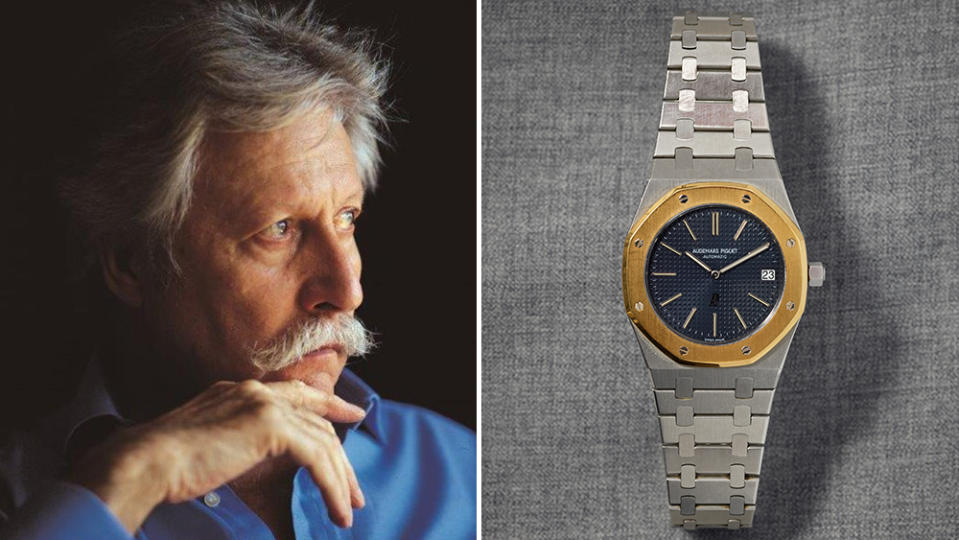How the Royal Oak Became Audemars Piguet’s Hottest Watch

What, exactly, is a “sports watch?”
Seems fairly straightforward. A sports watch is one which is worn to play sports. A watch of action—something robust, not too heavy, highly legible, and preferably, not too expensive—just in case you beat the hell out of it while sporting. Some sports watches were designed for specific sports, like the Rolex Submariner for diving, but there were also waterproof durable watches like the Rolex Oyster Perpetual that were not specific to any one sport.
More from Robb Report
Blancpain Just Dropped the World's First Ceramic Dive Watch With an Annual Calendar and Moon-Phase
3 Watch Market Data Tools Designed to Make You a Smarter Collector
Rolex is still the main name that springs to mind when one thinks of these no-nonsense, durable sports watches, but in 1972 a very traditional Audemars Piguet—then known for exquisite dress watches and grand complications—blew the walls off horological categories and shocked the watch industry with the Royal Oak. With this singular, revolutionary timepiece, the “luxury sports watch with integrated bracelet” was born.

So, how was a storied Swiss maison such as Audemars Piguet, established in 1875, to compete in this new category? After all, Audmars Piguet produced so few chronographs during most of the 20th century—just 307 between 1930 and 1962—that AP didn’t bother giving them reference numbers. That was truly an old-school mode of production. But Patek Philippe, Audemars Piguet’s main competitor (then and now), had upped production from around 1000 watches per year to well over 10,000 with the introduction of the Calatrava. The world was moving from hand-made to factory-produced, and AP needed to keep up. However, with such a high level of craftsmanship infused into its watchmaking, there was no way such a brand could churn out reams of cheap timepieces to compete with the everyday sports watch, especially the cheap quartz units coming out of Japan. Even a simple time-only sports watch from AP had to be amazing.
What could AP do?
The answer, as it turns out, was to call Gérald Genta. The young Swiss industrial designer, who had previously designed watches for Universal Genève and Omega, was tapped to design Audemars Piguet’s first “luxury sports watch.”

According to Genta, the brief was simple: AP’s managing director George Golay called him on the phone at 4 pm on April 10th, the night before the annual Swiss Watch Show (later known as “Baselworld”) and said, “Mr. Genta, we have a distribution company that has asked us for a steel sports watch that has never been done before—and I need the design sketch for tomorrow morning.” (The distribution company was the SSIH, Société Suisse pour l’Industrie Horlogère, which was helping Golay expand AP’s reach. It was three executives of the SIHH, in point of fact, that dreamt up the idea for a luxury steel sports watch. And it was George Golay who had the vision to take up their challenge.)
What Genta came up with was completely unconventional.
For one, it eschewed the traditional round shape of contemporary timepieces in favor of a tonneau-shaped case with a prominent octagonal bezel inspired by—or so Genta recalls—a deep-sea diver’s helmet. Look closely and you’ll notice eight visible, octagonal screws, further suggesting the aquatic theme. This design is complemented by a unique, integrated bracelet (which is extraordinarily difficult to machine, by the way) and a dial executed in a petite tapisserie motif, giving it a dynamic look lacking in many other sports watches. (The name itself, if you’re curious, continues the nautical story—Royal Oak was a series of eight British Royal Navy vessels.)

Genta’s watch wasn’t an immediate hit upon its release at the 1972 Swiss Watch Show. It was odd-looking, featuring exposed screws, an octagonal bezel, and an integrated bracelet, and at 3,300 Swiss francs, it was many times the price of a contemporary Rolex Submariner. It was more expensive, even than Patek Philippe’s Calatrava. The Royal Oak was what some might call a “headscratcher.”
But slowly, people began to catch on. Good advertising helped: “The costliest stainless steel watch in the world,” ran one campaign in the American market. “It takes more than money to wear a Royal Oak,” went another. The best ad? “Would you buy a Rembrandt for its canvas?” The fact that the Royal Oak was wildly expensive was no deterrent back in the 1970s and into the 1980s, when flaunting wealth became perfectly acceptable in ways it was not directly after World War II and through the 1960s.
The Royal Oak, in short, saved Audemars Piguet. In fact, one could argue it re-elevated mechanical watchmaking to a certain echelon by making it relevant again.
The Royal Oak Through Time
What follows are standout examples of the Royal Oak from the past 50 years. As 2022 is the original model’s 50th anniversary, we’ll conclude with a spotlight on the newest models, specifically the ultra-hot “Jumbo” Extra-Thin models, that were announced early this year.
1970s
Royal Oak Ref. 5402ST

The very first Royal Oak, the reference 5402ST, was released in a series of 1,000 pieces in 1972. After this “A” series sold out, AP issued another batch of 1,000 A-series watches, after which it continued on to B, C and D serials. The A-series is distinctive for the presence of the “AP” initials above 6 o’clock, rather than below 12 o’clock. At a width of 39 mm, it was a large watch for the era—in fact, it was nicknamed the “Jumbo”—but clocked in at just 7 mm thick. It featured only a date window, though later releases became much more complicated. Its bracelet, with 154 components in 34 unique sizes, was so difficult to manufacture that famed bracelet specialists Gay Freres couldn’t quite live up to the order. (Other firms later took up the manufacturing mantle.)
Powering the ref. 5402ST was an interesting movement, the automatic Calibre 2121. Highly finished despite being hidden behind a solid case back, it was based upon the Calibre 2120 and modified with a date wheel. The Cal. 2120, launched in 1967, was itself a joint project funded by Audemars Piguet, Patek Philippe and Vacheron Constantin, and led by Jaeger-LeCoultre: JLC produced an ultra-thin, automatic movement in the form of the Cal. 920, which was then adopted by the other three firms and customized according to their needs. (It went on to power both the Patek Philippe Nautilus in the form of the Cal. 28-255 C and Vacheron’s 222 as the Cal. 1120.) Just 3.05mm thick and beating at 19,800, it featured an advanced anti-shock system that made it appropriate for active use.
Reference: 5402ST
Diameter: 39mm
Movement: Calibre 2121 automatic (JLC Cal. 920 base)
Price on Secondary Market Today: $100K-$200K
1980s | Royal Oak Perpetual Calendar Ref. 5554 and 25554

After successfully developing an automatic perpetual calendar movement, the Cal. 2120/2800 (based upon the Cal. 2120), AP cased it in a dressy, precious metal timepiece dubbed the ref. 5548, which debuted in 1978. In 1984, the maison debuted the first quantieme perpetual-equipped AP, the ref. 5554. (Between 1984 and 1985, AP changed its numbering system to include only 5-digit references — thus the 5554 became the 25554.) Still 39mm wide and clocking in at just 7.5mm thick, this was a big step for Audemars Piguet, who for decades had made QPs only in incredibly limited series, and certainly never in the form of a sports watch.

Because of the case’s thinness and the presence of the calendar corrector buttons on its flanks, it was incredibly difficult to machine in such a way that it maintained 20m of water resistance — further proof of AP’s expertise in the realm of mechanical engineering. Each watch in this model range was equipped with an integrated bracelet in matching metal, and featured a dial with a month indicator at 12 o’clock; date indicator at 3 o’clock; moon phase indicator at 6 o’clock; and day indicator at 9 o’clock. Gone was the petit tapisserie dial of the ref. 5402ST in favor of a simpler, silver-toned dial. Roughly 1,600 pieces were produced before AP introduced the watch’s successor, the ref. 2120/2802, which included a leap year indicator, was introduced in 1993.
Reference: 5554 and 25554
Diameter: 39mm
Movement: Calibre 2120/2800 automatic (JLC Cal. 920 base)
Price on Secondary Market Today: $250,000+
1990s | The Royal Oak Offshore Ref. 25721ST

In 1993, AP debuted a riff on the Royal Oak from a young designer named Emmanuel Gueit, which he had conceptualized back in 1989. (The watch was meant to debut in 1992, in time for the Royal Oak’s 20th anniversary, but production took a year longer than expected.) Featuring a massive (for the time) 42 mm case, the new Royal Oak Offshore was a chronograph for the young and adventurous, with bold colors, blackened chronograph pushers and crown, and leather or rubber straps. Outfitted with a méga-tapisserie dial and an outer flange for the tachymeter scale, the ref. 25721ST was powered by the Audemars Piguet Calibre 2126/2840, based upon the JLC Calibre 888 with Debois-Depraz chronograph module. When Genta saw it at Baselworld, he evidently hated it, storming into the AP booth and demanding to know what the maison had done to his beloved Royal Oak.
In time, however, the “Beast,” as it was dubbed, would prove to be one of AP’s most popular models. (It didn’t hurt that celebrities such as actor Arnold Schwarzenegger and Formula One drivers Michael Schumacher and Rubens Barrichello were seen wearing it.) The first run of the ref. 25721ST was produced in just 100 examples, none of which featured the word “Offshore” anywhere on the case or dial — they were signed only “Royal Oak” on the case back, and individually numbered. This run was referred to as D-series watches. Various series were produced until 2004, and, as of 2005, it is now in its F-serial range.
Reference: 25721ST
Diameter: 42 mm
Movement: Calibre 888 automatic
Price on Secondary Market Today: $250,000+
2000s | Royal Oak Concept

In celebration of the 30th anniversary of the Royal Oak in 2002, AP debuted the Royal Oak Concept. Retaining its octagonal bezel but featuring an entirely new case design, the watch was machined from Alacrite 602, a special alloy of cobalt, chrome, tungsten carbon, silicon and iron used in aeronautics that was also the hardest material available. A true “superwatch,” it was powered by the manually wound Calibre 2896, which included a tourbillon, a power reserve indicator, and a dynamographe, a device that displays mainspring torque. More notable even than these features were two large shock absorbers — visible on the watch’s dial — that increased shock resistance to some 50Gs.
A special crown at 5 o’clock controlled functions, while the main, oversized crown at 3 o’clock was used for time-setting. Preceding the age of the “superwatch” of Richard Mille, MB&F and other contemporary independent brands, the Concept showed that world that far from being a stuffy legacy brand, Audemars Piguet was willing to continuously reinvent itself, pushing the envelope of what was possible in modern watchmaking.
Reference: 25980AI
Diameter: 44mm
Movement: Calibre 2896 hand-wound
Price on Secondary Market Today: $200,000+
2010s | Royal Oak ref. 15202

In 2012, Audemars Piguet introduced a reference that paid homage to the original ref. 5402ST, dubbed the ref. 15202. Housed in a 39mm case with a petite tapisserie dial, one would be forgiven for confusing this reference with one from the 1970s, though the brand gave it a display caseback. In 2012, in time for the RO’s 40th anniversary, Audemars Piguet updated it with the “AP” signature above 6 o’clock in homage to the ref. 5402ST. Powered by the Calibre 2121 automatic movement — the same as that used in the very first Royal Oak — it clocked in at just 8.1mm. While AP marketed the watch as “Extra-Thin,” fans continued to refer to it as “Jumbo” given its 39mm case.
Other slight changes included a switch from a white date wheel to a black version on the blue and black dials and the addition of a double-deployant clasp to the watch’s bracelet. Originally available in steel and rose gold, a yellow gold model debuted in 2017, followed by the ref. 15202IP in titanium and platinum. In March of 2021, AP announced that the 15202 would be discontinued in 2022 — in time for the Royal Oak’s 50th anniversary — and replaced by a new reference.
Reference: 15202
Diameter: 39mm
Movement: Calibre 2121 automatic (JLC Cal. 920 base)
Price on Secondary Market Today: $150,000-$300,000
The Royal Oak Today

In January of 2022, Audemars Piguet CEO Fran?ois-Henri Bennahmias debuted an entirely new group of Royal Oak models in celebration of the collection’s 50th anniversary, promising that a “big chunk” of watch allocations will go to first-time AP buyers. (In recent years, a new Royal Oak has become a laughably difficult thing to buy at retail — much like a new Patek Philippe Nautilus or a new steel sports watch from Rolex.) Each new automatic model in the collection will come with a special rotor visible through a display caseback that reads “50 Years” — after December 31, 2022, watches will ship with a standard rotor.
Of all the pieces in the new collection, the biggest news of all concerns the replacement of the aforementioned ref. 15202 with the new ref. 16202. Aesthetically, much is the same as it ever was: The watch features a 39mm “Jumbo” case (“Extra-Thin,” if you like) with an automatic movement — in this case, the new automatic Calibre 7121, which is replacing the Cal. 2121 for the first time in a time-and-date Royal Oak. Equipped with a quick-date system and a larger barrel, it features 55 hours of power reserve, bi-directional winding and highly decorated parts.
Within the 16202 collection are four models in steel, platinum, pink gold and yellow gold, the latter two of which feature new smoked petite tapisserie dials. The steel version is equipped with the classic blue finish of the original 1972 Royal Oak ref. 5402ST, effectively closing the circle on the first 50 years of Royal Oak history.
Reference: 16202 (steel)
Diameter: 39mm
Movement: Calibre 7121 automatic
Price: $33,200
Best of Robb Report
Sign up for Robb Report's Newsletter. For the latest news, follow us on Facebook, Twitter, and Instagram.
